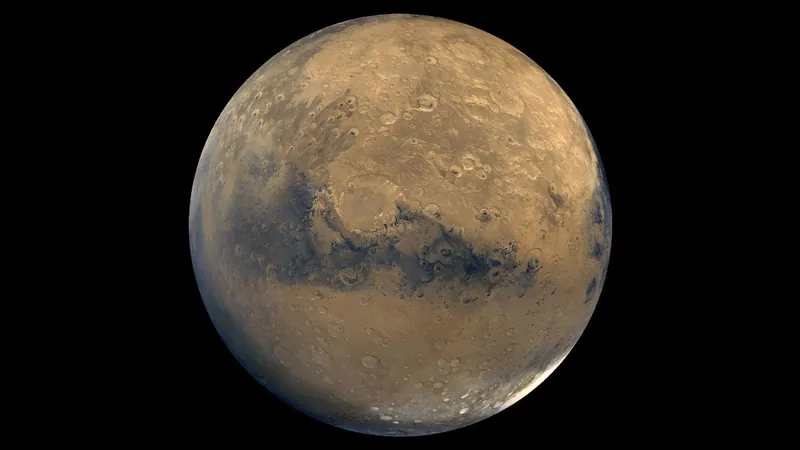
Could Mars Have Supported Life Longer Than We Thought? New Findings on the Red Planet's Magnetic Field!
2024-11-04
Author: Wei
Mars' Magnetic Field and Its Implications
Mars, our enigmatic neighbor, may have had a magnetic field that endured for a staggering 200 million years longer than previously believed, a revelation that dramatically alters our understanding of its potential to host life. This groundbreaking research, spearheaded by planetary scientists from Harvard University, suggests that the magnetic field could have overlapped with the presence of liquid water on the surface—an essential ingredient for life.
Understanding Mars' Magnetic History
The insight stems from a re-evaluation of Mars' magnetic history, which had been clouded by misconceptions around magnetic-pole reversals. It was long assumed that the planet’s magnetic dynamo ceased around 4.1 billion years ago, coinciding with the formation of large impact basins. However, the research led by Sarah Steele and her team posits that the magnetic field might not have vanished but rather experienced a series of reversals, leading to an underestimation of its strength during that time.
The Importance of Magnetic Fields
Understanding Mars' magnetic field is crucial for piecing together its ancient history. As Steele highlights, “Planetary magnetic fields are our best probe to answer a lot of those questions, and one of the only ways we have to learn about the deep interiors and early histories of planets.”
Geodynamo Effect and Atmospheric Loss
A planet's magnetic field is generated by a geodynamo effect, which on Earth is sustained by the dynamics of its iron-nickel core. In contrast, Mars, which is approximately half the diameter of Earth, cooled much more rapidly. This cooling interrupted the convection currents crucial for maintaining its magnetic field. As a result, without a global magnetic shield, Mars succumbed to solar winds that depleted its atmosphere and stripped away its water, crucial for life.
Reevaluating Past Beliefs
Researchers had believed that the lack of a magnetic field during the bombardment of Mars—between 4.1 and 3.7 billion years ago—was verified by studying ferromagnetic minerals left in the rocks of large impact craters. Yet, Steele's team contends that this interpretation may have overlooked evidence of magnetic field reversals depicted in Martian meteorites such as Allan Hills 84001.
Implications for Life on Mars
Their recent computer modeling underscores that the apparent absence of a magnetic field during the impact basin formation was likely due to ongoing pole reversals—the same phenomenon that alters Earth's magnetic field every few hundred thousand years, causing confusion in the orientation of ferromagnetic materials.
A New Timeline for Mars' Magnetic Field
If Steele's assertion holds true, this implies that Mars' global magnetic field persisted until at least 3.9 billion years ago. This additional time frame is not trivial; it overlaps with the period when Mars could have harbored liquid water, providing a habitable environment that may have been shielded from harmful cosmic radiation.
The Search for Ancient Life
What does this mean for the prospect of life on Mars? The extended lifespan of the magnetic field suggests that the planet might have supported primitive life far longer than we previously assumed, allowing organisms to flourish in a watery haven. This tantalizing possibility reignites the debate surrounding the history of life on Mars—was it ever able to take root and thrive?
Atmospheric Evolution and Future Exploration
Moreover, the persistence of the magnetic field may also influence our understanding of Mars' atmospheric evolution. Continuous monitoring of Mars' atmosphere by NASA's MAVEN orbiter allows scientists to gauge the rate of atmospheric loss. If the magnetic shield didn’t disappear until later, this means that atmospheric depletion could have commenced after a more stable environment had formed, necessitating a reevaluation of how Martian conditions have changed over eons.
Conclusion
As we unravel the mysteries of Mars, every new discovery throws open the doors to exciting possibilities. Could we be edging closer to finding signs of ancient Martian life? Only time and further exploration will tell. Stay tuned for more updates from the forefront of space exploration!

 Brasil (PT)
Brasil (PT)
 Canada (EN)
Canada (EN)
 Chile (ES)
Chile (ES)
 España (ES)
España (ES)
 France (FR)
France (FR)
 Hong Kong (EN)
Hong Kong (EN)
 Italia (IT)
Italia (IT)
 日本 (JA)
日本 (JA)
 Magyarország (HU)
Magyarország (HU)
 Norge (NO)
Norge (NO)
 Polska (PL)
Polska (PL)
 Schweiz (DE)
Schweiz (DE)
 Singapore (EN)
Singapore (EN)
 Sverige (SV)
Sverige (SV)
 Suomi (FI)
Suomi (FI)
 Türkiye (TR)
Türkiye (TR)